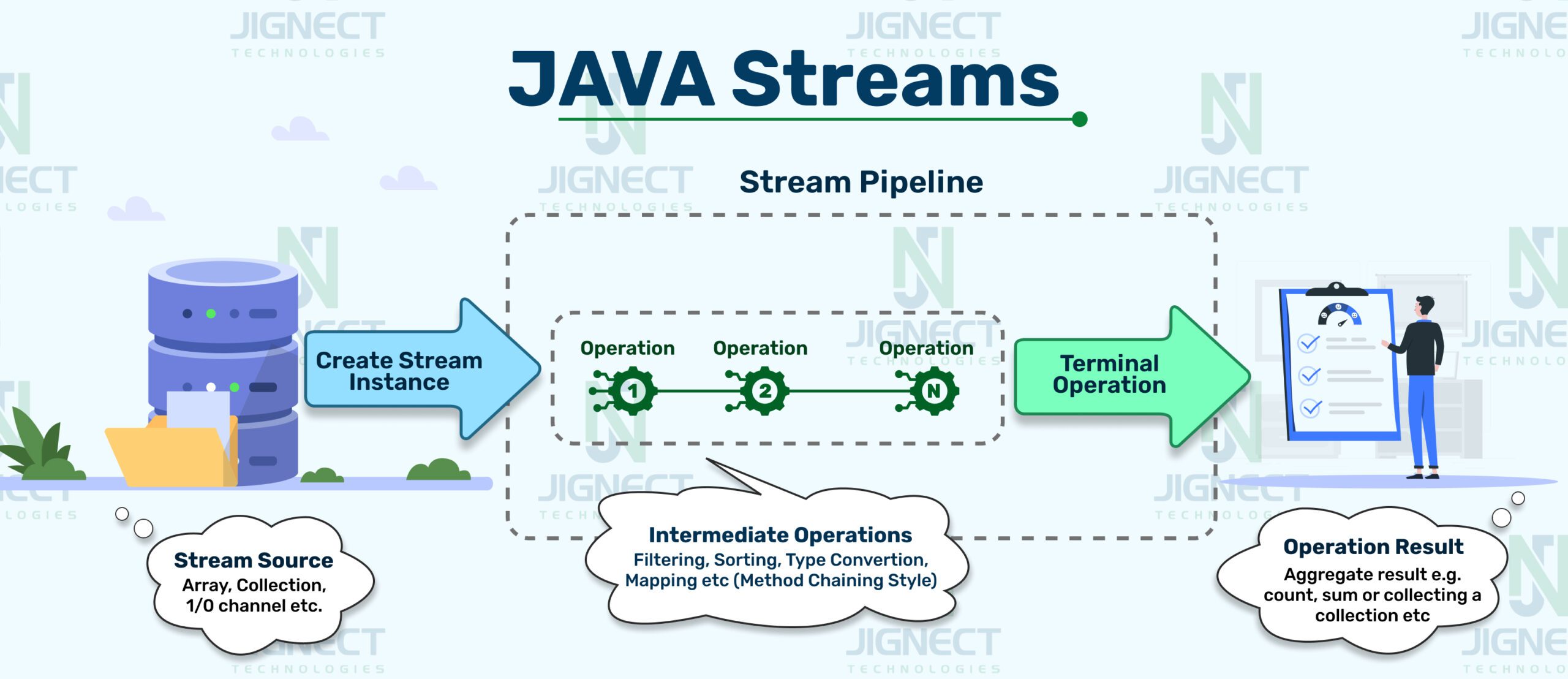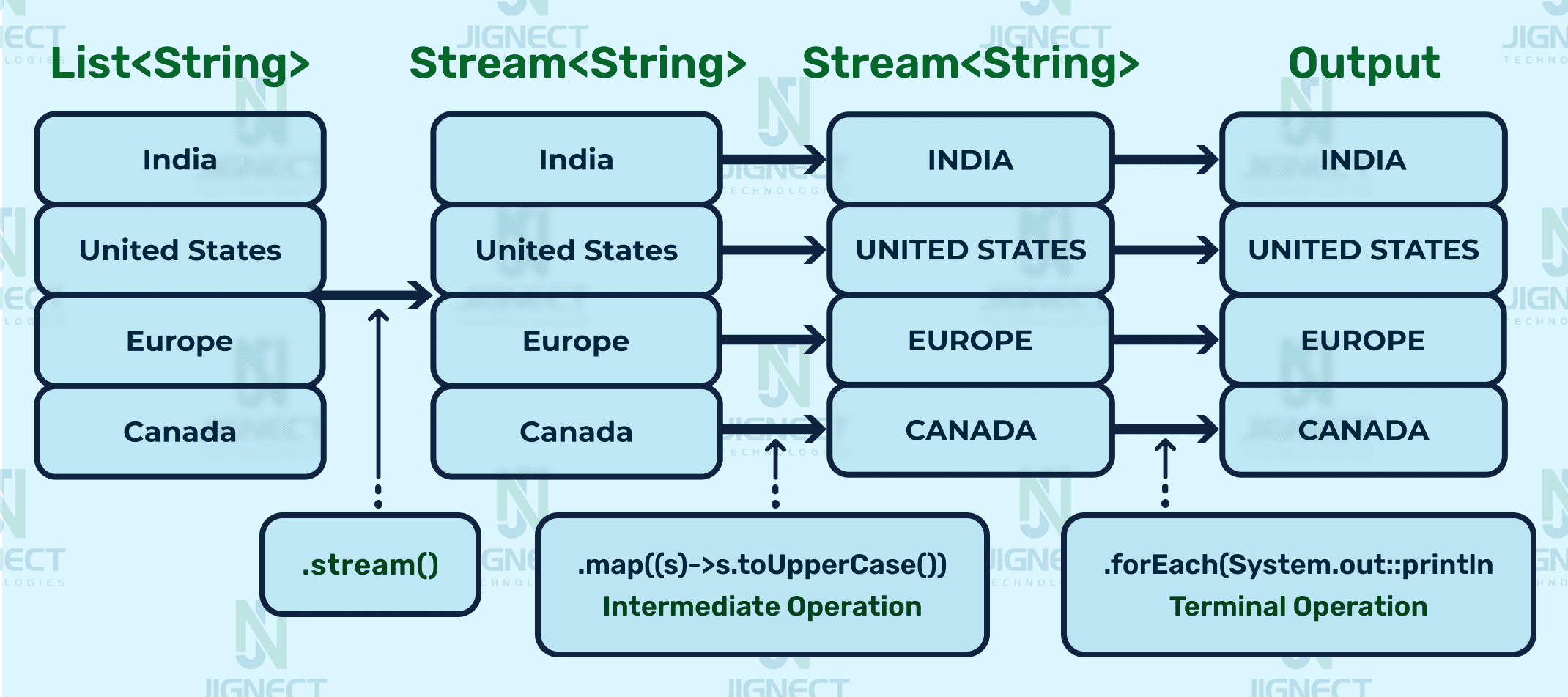In the dynamic realm of software testing, maintaining the integrity and functionality of applications stands as a core objective. QA automation engineers serve as the frontline guardians, meticulously crafting and executing test scripts to validate performance and unearth potential flaws. Within this landscape, a deep comprehension of data structures and Java stream processing is imperative. Java streams provide a modern and efficient way to process collections of data, offering a functional programming approach that enables developers to perform complex operations with concise and expressive code. This blog delves into the pivotal role of data structures and functional streams in QA automation, shedding light on their significance and exploring fundamental structures that empower QA engineers to build resilient and efficient test automation scripts.

Types of Stream Operations
1. Intermediate Operations
Return a stream that can be linked with other intermediate operations with dot.
2. Terminal Operations
Returns void or non stream output.
For performing a computation, stream operations are incorporated into a Stream pipeline. A Stream pipeline consists of:
- Source
- Zero or more intermediate operations
- Terminal operations
In below example, Stream pipeline consists of :
- Source : String List
- Intermediate operation : Map
- Terminal operation : forEach

package streamsInJava;
import java.util.Arrays;
import java.util.List;
public class StreamOperations {
public static void main(String[] args) {
List<String> countryList = Arrays.asList("India", "United States", "Europe", "Canada");
countryList .stream()
.map((s) -> s.toUpperCase())
.forEach(System.out::println);
}
}Output :
INDIA
UNITED STATES
EUROPE
CANADAIntermediate Functional Stream Operations
1. map() :
The map() function is utilized to transform a Stream<T> into a Stream<R>. It generates a single output of type ‘R’ for every input value of type ‘T’. It requires the Function interface as a parameter.
For Example, If you have a stream of a list of employees and you require a list of employee names, you just need to convert the Stream to a Stream.

List<String> employeeNames = employeesList.stream()
.map(e -> e.getName())
.collect(Collectors.toList());
System.out.println(employeeNames);Output :
[Dheeraj, Rushabh, Shubham, Parth]2. filter() :
The filter() operation is used to filter streams based on conditions. The Filter method takes a Predicate() interface that returns a boolean value.
For example, if you want to filter employees whose names start with ‘P’.

List<String> employeeNames = employeesList.stream()
.map(e -> e.getName())
.filter(s -> s.startsWith("P"))
.collect(Collectors.toList());
System.out.println(employeeNames);
Output :
[Parth]3. sorted() :
We can use the sorted() method to sort a list of objects. The sorted method, when used without arguments, sorts the list in natural order. Additionally, the sorted() method also accepts a comparator as a parameter to facilitate custom sorting.
List<Employee> employees = employeesList.stream()
.sorted()
.collect(Collectors.toList());
System.out.println(employees);
Output :
[Employee [name = Dheeraj, age = 27], Employee [name = Parth, age = 24], Employee [name = Rushabh, age = 22], Employee [name = Shubham, age = 26]]Here is the sorted() method example with Comparator as a parameter.
List<Employee> employees = employeesList.stream()
.sorted((e1,e2)->e1.getAge() - e2.getAge())
.collect(Collectors.toList());
System.out.println(employees);
Output :
[Employee [name = Rushabh, age = 22], Employee [name = Parth, age = 24], Employee [name = Shubham, age = 26], Employee [name = Dheeraj, age = 27]]
4. limit() :
limit() is used to limit the number of elements in the stream.
List<Employee> employees = employeesList.stream()
.limit(3)
.collect(Collectors.toList());
System.out.println(employees);
Output :
[Employee [name = Dheeraj, age = 27], Employee [name = Rushabh, age = 22], Employee [name = Shubham, age = 26]]
5. skip() :
skip(int n) method is used to discard first n elements from the stream
List<Employee> employees = employeesList.stream()
.skip(3)
.collect(Collectors.toList());
System.out.println(employees);
Output :
[Employee [name = Parth, age = 22]]Terminal Functional Stream Operations
1. foreach() :
The foreach() method is a terminal operation used to iterate over a collection or stream of objects, taking a consumer as a parameter.
employeesList.stream()
.forEach(System.out::println);
Output :
Employee [name = Dheeraj, age = 27]
Employee [name = Rushabh, age = 22]
Employee [name = Shubham, age = 26]
Employee [name = Parth, age = 24]
2. collect() :
The collect() method is a terminal operation that performs mutable reduction on the elements of a Stream using a Collector. Collectors is a utility class that provides an inbuilt Collector.
List<String> employeeNames = employeesList.stream()
.map(Employee::getName)
.collect(Collectors.toList());
System.out.println(employeeNames);
Output :
[Dheeraj, Rushabh, Shubham, Parth]3. count() :
count() is used to count the number of elements in the stream.
long empCountStartWithS = employeesList.stream()
.map(Employee::getName)
.filter(s -> s.startsWith("S"))
.count();
System.out.println(empCountStartJ);
Output :
14. allMatch() :
allMatch() returns true when all the elements in the stream meet the provided condition.
boolean allMatch = employeesList.stream()
.allMatch(e -> e.getAge() > 20);
System.out.println("Are all the employees adult : " + allMatch);
Output :
Are all the employees adult : true
5. noneMatch() :
The noneMatch() function returns true if all elements in the stream do not meet the provided condition.
boolean noneMatch = employeesList.stream()
.noneMatch(e -> e.getAge() > 60);
System.out.println("Are all the employees below 60 : " + noneMatch);
Output :
Are all the employees below 60 : true6. min() :
min(Comparator) returns the minimum element in the stream based on the provided comparator, and it returns an object that contains the actual value.
Optional<Employee> minEmpOpt = employeesList.stream()
.min(Comparator.comparing(Employee::getAge));
Employee minAgeEmp = minEmpOpt.get();
System.out.println("Employee with minimum age is : " + minAgeEmp);
Output :
Employee with minimum age is: Employee [name = Rushabh, age = 22]
7. max() :
max(Comparator) returns the maximum element in the stream based on the provided comparator, returning an object that contains the actual value.
Optional<Employee> maxEmpOpt = employeesList.stream()
.max(Comparator.comparing(Employee::getAge));
Employee maxAgeEmp = maxEmpOpt.get();
System.out.println("Employee with maximum age is: " + maxAgeEmp);Output :
Employee with maximum age is : Employee [name = Dheeraj, age = 27]Conclusion
In conclusion, Java streams, including various types of streams in Java, are a powerful addition to the Java programming language, providing a modern and efficient way to work with collections and process data. By mastering the concepts and best practices outlined in this guide, we can unlock the full potential of Java streams and elevate the quality and performance of our code. For more information about Java streams, please refer to the Official site.
Witness how our meticulous approach and cutting-edge solutions elevated quality and performance to new heights. Begin your journey into the world of software testing excellence. To know more refer to Tools & Technologies & QA Services.
If you would like to learn more about the awesome services we provide, be sure to reach out.
Happy Testing 🙂




